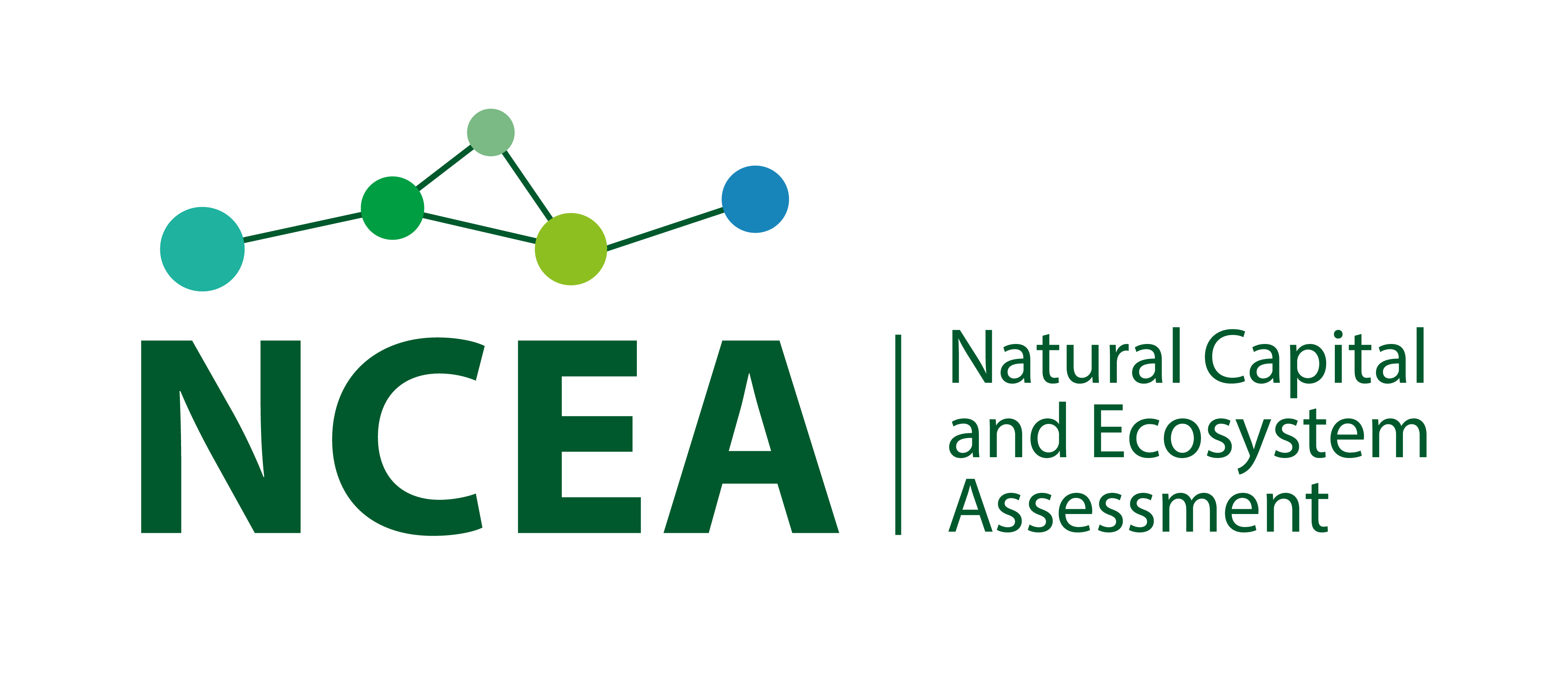Get to know the Coast-R Team
Coast-R is led by experts from six UK universities.
They represent a diverse range of academic disciplines, reflecting the broad challenges facing coastal communities and seas.

Prof Briony McDonagh
University of Hull
I’m a historical geographer and environmental historian with research interests in the green-blue humanities. I’m particularly interested in histories and cultures of water and flood from the medieval period to the modern day. As project lead on ‘Risky Cities: Living with Water in an Uncertain Future Climate’. I used creative and participatory methods, developed hand-in-hand with communities and creative organisations, to build water and climate action.
I have published widely on landscape and environmental change, on histories and cultures of living with water and flood, on women’s histories, and on the historical geographies of enclosure, commons and protest.
I am also Director of the Leverhulme Doctoral Scholarships Centre for Water Cultures, which pioneers a new, humanities-led research area – the ‘green-blue humanities’ – transforming our understanding of humanity’s relationships with water in the coastal regions of the world, past, present and future.
I’m really excited to be leading the Coast-R Network and working with a wide range of communities and organisations in order to address coastal resilience.
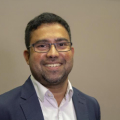
Prof Suraje Dessai
University of Leeds
I am Professor of Climate Change Adaptation at the Sustainability Research Institute in the School of Earth and Environment and Deputy Director for Policy Engagement at the Priestley Centre for Climate Futures, at the University of Leeds. My research and teaching focuses on the management of climate change uncertainties, perception of climate risks and science-informed policy around climate change impacts, adaptation and services.
I’m a member of the European Scientific Advisory Board on Climate Change since 2022 and was Lead Author in the Intergovernmental Panel for Climate Change (IPCC) 5th and 6th Assessment Reports, Specialist Advisor to the Joint Committee on the National Security Strategy of the UK Parliament (2022-23) and Champion of the UK Climate Resilience Programme (2019-23). I will use my experience of championing this major research programme and working at the science-policy interface to support the Coast-R Network+.
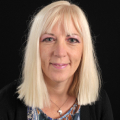
Dr Gill Hughes
University of Hull
I am a Senior Lecturer in the School of Education in Youth Work and Community Development/Education Studies and lead on the School’s Social Justice research theme. My work focuses on needs-led participatory approaches to research, knowledge exchange and engagement, building trusting relationships to foreground the voices of young people and communities, who have knowledge and expertise in issues and place-based working.
I hosted a community partnership project – #thehullwewant seeking needs and dreams for the future of Hull this led to many opportunities including the University of Hull’s Risky Cities project, where I was the co-researcher on community engagement, working with communities and young people to explore critical climate consciousness through arts based creative community engagement. I was a partner with the Sheffield University MAGIC project – a community led approach to creating flood adaptations. I am a joint co-ordinator for the Wellcome Trust / British Science Association innovative programme – the Ideas Fund in Hull. I am on the Advisory Board of the Hull Poverty Truth Commission and involved in its evaluation.
I am really excited to be part of the Coast-R Network, and to be working with communities around the country to explore and exchange knowledge and experiences together.

Dr Charlotte Lyddon
University of Liverpool
I am a lecturer in Coastal Dynamics in the Department of Geography and Planning at the University of Liverpool. My research interests are focused on coastal and estuarine processes & dynamics, coastal hazards, and coastal resilience.
My research is targeted towards better understanding the drivers of coastal hazards for improved awareness, hazard mitigation, and public safety. I use process-based and shoreline response numerical models to simulate storm-driven hazard events, and data analytics to better understand how drivers coincide and interact. I am particularly interested in coastal hazards in estuaries, which experience drivers of flooding from both the land and the sea, under present and future climate conditions. My research engages stakeholders and end-users by providing essential information from model sensitivity tests and ‘what if’ scenarios to inform hazard assessments and alternative management scenarios.

Prof Stuart McLelland
University of Hull
I’m Deputy Director of the Energy and Environment Institute of the University of Hull and Professor of Water Science. My research is focused on the experimental modelling of rivers and coasts – particularly understanding how climate change impacts on these environments.
Recently, I’ve led the development of the University of Hull’s Green-Blue Living Laboratory to measure and understand the impact of surface water on communities and their environments.
The Coast-R project is an excellent opportunity to bring a new dimension to building coastal community resilience at a time when sea level rise and the impacts of climate change will impact on the shape of our coastal environments.

Prof Andrew Plater
University of Liverpool
I am a coastal geomorphologist with a keen interest in reconstructing system response to changes in sea-level, sediment supply and extreme events (storms and high rainfall). Most of my work focuses on sedimentary archives of environmental change, and what can be determined from these archives in terms of environmental forcing, response and recovery, human impact and sediment provenance. My work also links to the application of modelling and monitoring to detect, characterise and predict coastal change for climate change adaptation. I also co-ordinate a series of projects that are supporting the delivery of clean growth ambitions in Liverpool City Region. This centres on the deployment of European Regional Development funds in facilitating exciting collaborations across the University of Liverpool and SMEs in the NW and in the Maritime Sector.
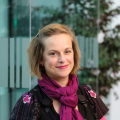
Dr Kate Smith
University of Hull
My research interests centre around the interactions between water, people, landscape and identity. Within the Energy and Environment Institute this has included research on using mobile technologies for flood warnings, which led to the UK Government’s adoption of this technology; using social value as a way of evaluating flood resilience innovation; and understanding the impact of large-scale public art interventions on people’s engagement with action for climate empowerment.
My work in flood risk and resilience started in the Flood Innovation Centre, developing novel and creative ways to engage diverse publics with flood resilience and climate change adaptation. I combine research and knowledge exchange activities with teaching on MSc in Flood Risk Management.
I’m excited to be part of the Coast-R network+ and will be leading on the monitoring and evaluation of the work that we do to bring academics, practitioners, policy-makers and communities together for better coastal futures.
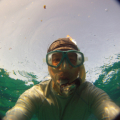
Dr David Bailey
University of Glasgow
I am a marine biologist with broad interests. My research group at the University of Glasgow work in all marine environments from Antarctica to coral reefs, and also around Scotland. The main theme is the conservation and management of marine systems and I also have a long-standing interest in deep-water biology.
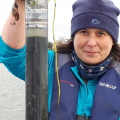
Prof Sarah Davies
Aberystwyth University
I’m a geographer with research interests in climatic and environmental change over a range of timescales. I use evidence from sediment cores alongside documentary records to investigate human-environment interactions, climate change and extreme events. I have worked in a range of contexts, most recently focusing on coastal landscapes.
I led the Aberystwyth University contribution to the CHERISH project, funded by the EU Ireland-Wales Territorial Co-operation programme. The project brought together geographers, geoscientists and archaeologists to investigate the impacts of climate change on coastal heritage around the Irish and Welsh coasts, involving a wide range of stakeholders and communities. I am currently Head of the Department of Geography and Earth Sciences at Aberystwyth University.
I’m delighted to be contributing to the Coast-R Network and look forward to building collaborations across Wales and the wider UK.
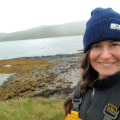
Dr Charlotte Hopkins
University of Hull
I am a Senior Lecturer in Marine Conservation at the University of Hull, specialising in understanding human perceptions of the marine environment and how these can be incorporated into conservation, planning, marine management and sustainable use.
In 2021-22, I led a British Council project to look at resilience across Indonesian seafood supply chains in the context of the COVID-19 pandemic and have worked on various other issues relating to seafood sustainability. My current research combines a number of topic areas including marine rewilding, ocean literacy and human-nature connectedness to broadly explore our relationship with the sea. I also supervise a number of PhD students working in these areas.
I’m excited to join the Coast-R network and help support a growing community, building and sharing knowledge and practice around coastal resilience.
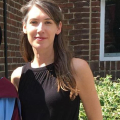
Prof Stephanie Jones
University of Southampton
I am a Professor of Literature and Law with a particular interest in marine and maritime literatures. I am currently involved in three areas of research. The first focuses on the representation of piracy in legal and fictional texts. This work addresses the impact of imaginative and regulatory representations of ‘the pirate’ on definitions of the ocean as a legal geography, and as a site of both freedom and unfreedom. This project connects to a second current of research on the critical power of fiction and poetry to raise questions about ‘human rights’ as a pre-eminent language for expressing liberty. A newer, third project involves a turn to more material matters. This work addresses the role that the arts—and particularly creative writing—can play in mitigating coastal waste, increasing ocean literacy, and in attending to the more-than-human in local seascapes.
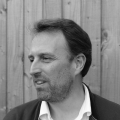
Dr Neil Macdonald
University of Liverpool
I am situated at the centre of the geography discipline, working across traditionally perceived disciplinary boundaries. My research explores two complimentary aspects:
The first is focused on developing a better understanding of climatological, hydrological and geophysical extremes an example is current work supporting several DEFRA funded projects in developing Natural Flood Management interventions across catchments to reduce flood risk.
The second aspect explores how we can improve understanding of risk and build more resilient communities and societies using a variety of physical (e.g. flood marks) and social materials (e.g. diaries) over long timescales. I am interested in how such materials have come about, their content, have previously been used and how they can help inform and educate today, which is critical to engaging people and helping them understand how rather complex and sometimes perceived abstract threats, such as climate change can have an impact on them and the places they know directly.
Past changes or adaptations (including doing nothing), whether societal, behavioural or modification of the landscape/environment may come about in response to extreme events, but also periods of mundane weather and climate that may impact how we can respond to extreme events when they do occur.
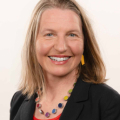
Prof Larissa Naylor
University of Glasgow
I am a Professor of Geomorphology and Environmental Geography at the University of Glasgow, UK. I am coastal geomorphologist who addresses ecological and climate change challenges facing society, where my work has shaped climate change, marine, flooding and planning policies and climate change adaptation action plans, and I have advised the International Union for Conservation of Nature (IUCN), the World Bank’s Inspection Panel and inputted to the Intergovernmental Panel on Climate Change’s (IPCC) 4th and 5th Assessments.
My work has provided exemplars of international best practice on coastal risk management and nature-based solutions projects, including co-leading a chapter in US Corps of Army Engineers International guidelines on Natural and Nature-based Solutions for managing coastal flooding and erosion. Public engagement is a core pillar of my work where I have worked with wildlife trusts, schools and Glasgow Science Centre to co-develop projects which bring coastal climate change and ecology issues to life for children, communities and policymakers. My work has also been featured by multiple news outlets including the New Scientist, The Sunday Times, BBC, FrenchNews24, Inside Climate News and National Geographic Kids.

Dr Katherine Simpson
University of Glasgow
I am a lecturer in One Health and Environmental Economics at the University of Glasgow, specialising in interdisciplinary approaches to conservation and environmental management. My research integrates methods from environmental economics and spatial ecology to address the complex challenges of land use change and its management. I aim to balance the demands for food, housing, and infrastructure with the need to meet conservation priorities and biodiversity targets amidst climate change.
My work at the Coast-R network is focused on applying natural capital approaches – bringing nature, the environment and how these support us into decision making – to enhance coastal resilience and adaptation strategies. I am particularly interested in how changes in our coastal environments affect human health and wellbeing, bringing insights from health economics to support network members in developing sustainable and resilient coastal communities.
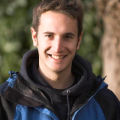
Prof Fraser Sturt
University of Southampton
I am a maritime archaeologist and specialist in geospatial data and interdisciplinary research. While a lot of my work is on understanding the past and people’s changing relationships with the sea, it is always done in the context of the present – of different contemporary communities, their identities and needs. These interests have seen me work on projects as diverse as modelling changing sea-levels over the last ten thousand years through to impact assessment of major offshore developments. I am looking forward to helping develop the Coast-R network and learning from the community it develops.













